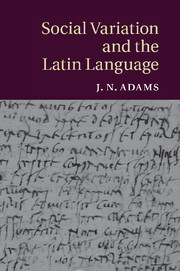
-
Select format
-
- Publisher:
- Cambridge University Press
- Publication date:
- June 2013
- May 2013
- ISBN:
- 9780511843433
- 9780521886147
- 9781316629499
- Dimensions:
- (228 x 152 mm)
- Weight & Pages:
- 1.49kg, 956 Pages
- Dimensions:
- (229 x 152 mm)
- Weight & Pages:
- 1.5kg, 956 Pages
You may already have access via personal or institutional login
Book description
Languages show variations according to the social class of speakers and Latin was no exception, as readers of Petronius are aware. The Romance languages have traditionally been regarded as developing out of a 'language of the common people' (Vulgar Latin), but studies of modern languages demonstrate that linguistic change does not merely come, in the social sense, 'from below'. There is change from above, as prestige usages work their way down the social scale, and change may also occur across the social classes. This book is a history of many of the developments undergone by the Latin language as it changed into Romance, demonstrating the varying social levels at which change was initiated. About thirty topics are dealt with, many of them more systematically than ever before. Discussions often start in the early Republic with Plautus, and the book is as much about the literary language as about informal varieties.
Awards
Winner of the 2013 PROSE Award for Language and Linguistics
Reviews
'Surprisingly accessible … Adams prizes clarity and precision … The book emerges as an intellectual cousin of Sir Ronald Syme's classic analysis of the rise of the Emperor Augustus, The Roman Revolution.'
Source: Times Literary Supplement
'More than any scholar of the modern era, [Adams] has revealed features of Latin which bring the language to life as a dynamic vehicle of communication among everyday speakers. … The present study reflects [his] mastery of an extraordinary range of Latin texts. … [Adams] has given us a rich resource for consultation; he has addressed a range of topics worthy of further research; he frequently provides a potent corrective and supplement to standard Latin grammars and accounts of the rise of Romance languages.'
Source: The Classical Review
'… Adams' unsurpassed knowledge of the Latin language and his outstanding philological acumen [are] everywhere on display in this book, which contains a wealth of new insights into Latin texts of all periods. There will be a temptation for Latin scholars to buy this book and use it as a work of reference. The organization of the chapters, the level of detail and the excellent indices mean that it could profitably service as such … Those who read [it] will undoubtedly be richly rewarded.'
James Clackson Source: The Journal of Roman Studies
Contents
Metrics
Altmetric attention score
Full text views
Full text views help Loading metrics...
Loading metrics...
* Views captured on Cambridge Core between #date#. This data will be updated every 24 hours.
Usage data cannot currently be displayed.
Accessibility standard: Unknown
Why this information is here
This section outlines the accessibility features of this content - including support for screen readers, full keyboard navigation and high-contrast display options. This may not be relevant for you.
Accessibility Information
Accessibility compliance for the PDF of this book is currently unknown and may be updated in the future.


